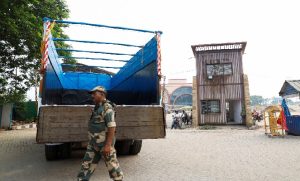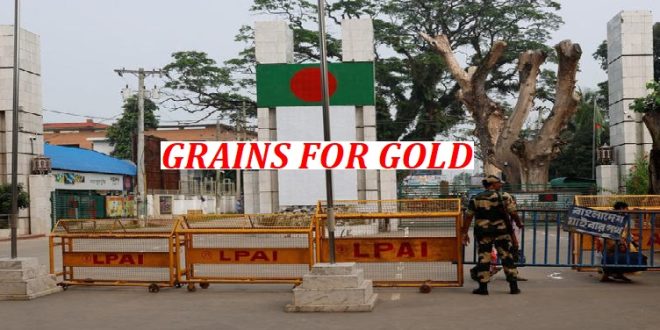05-12-2024
NEW DELHI/ PETRAPOLE: Guards on either side of a border checkpoint between India and Bangladesh scour vehicles and frisk passengers in a hunt for illicit consignments of gold and drugs, as well as food staples such as sugar, grain and even onions.
 “We caught smugglers in August who were transporting sugar concealed beneath a layer of sand in their vehicle,” said an officer of India’s Border Security Force (BSF) in the northeastern city of Shillong, who sought anonymity.
“We caught smugglers in August who were transporting sugar concealed beneath a layer of sand in their vehicle,” said an officer of India’s Border Security Force (BSF) in the northeastern city of Shillong, who sought anonymity.
Despite such efforts, illegal barter trade of gold for food items has surged since mid-2022, as India’s export curbs fuelled a vast disparity with prices in Bangladesh, causing combined government revenue losses of billions of dollars.
The smuggling distorts India’s bullion trade with discounts from official prices, hides unaccounted wealth, and weakens New Delhi’s efforts to curb food inflation by limiting exports.
At the same time it undermines Bangladesh’s import reduction measures aimed at boosting local farmers’ production.
The practice of smuggling gold to buy grain has persisted even after India, the world’s second-largest gold consumer, slashed 9 percentage points from its import duty in July, taking it to the lowest in more than a decade.
It is driven by significantly higher food prices in Bangladesh, which traditionally relies heavily on Indian supply but instead of simply exploiting the price difference between Indian and overseas gold, grey market operators use gold to barter for items such as sugar, wheat, and onions smuggled into Bangladesh.
The goods are concealed, said a BSF officer, citing the example of a smuggler in India’s West Bengal state, arrested in October with 4.7 kg (10.3 lb) of gold worth 35.1 million rupees ($414,000) stashed in his motorcycle’s air filter.
He had been offered just 10,000 rupees to ferry 18 gold biscuits into India to pay for food items already smuggled into Bangladesh, said the officer, who spoke on condition of anonymity.
 On India’s border with Bangladesh, the BSF follows a non-lethal policy that reduces deterrence, unlike the western border with Pakistan, where officers carry firearms to block illegal entry, the officer added.
On India’s border with Bangladesh, the BSF follows a non-lethal policy that reduces deterrence, unlike the western border with Pakistan, where officers carry firearms to block illegal entry, the officer added.
Traditionally the biggest supplier of grains to Bangladesh, India imposed curbs on exports of staples such as wheat, sugar, rice, onions and pulses to rein in food inflation from 2022 but gold prices have rallied more than 50% since the middle of that year, encouraging wider activity by grey market operators to exploit the arbitrage opportunity as food prices in Bangladesh spiked as much as 150% over those in India.
The gold-for-grain trade flourished as India steadily tightened curbs on food exports over the past two years, said a grains dealer in the eastern city of Kolkata, who spoke on condition of anonymity.
More than 2 million metric tons of staples have been smuggled into Bangladesh each year in exchange for gold, up from less than 300,000 tons before India’s curbs, officials estimate.
“The government limits farm exports to quickly lower local prices but smuggling weakens that strategy, and farmers end up bearing the brunt of the restrictions,” said Balwant Holkar, a trader in Lasalgaon in the western Indian state of Maharashtra.
Meanwhile, India’s illegal imports of about 156 metric tons of gold last year, worth about $9 billion, were up from 100 tons in 2022, the World Gold Council (WGC) says.
 Pressmediaofindia
Pressmediaofindia




